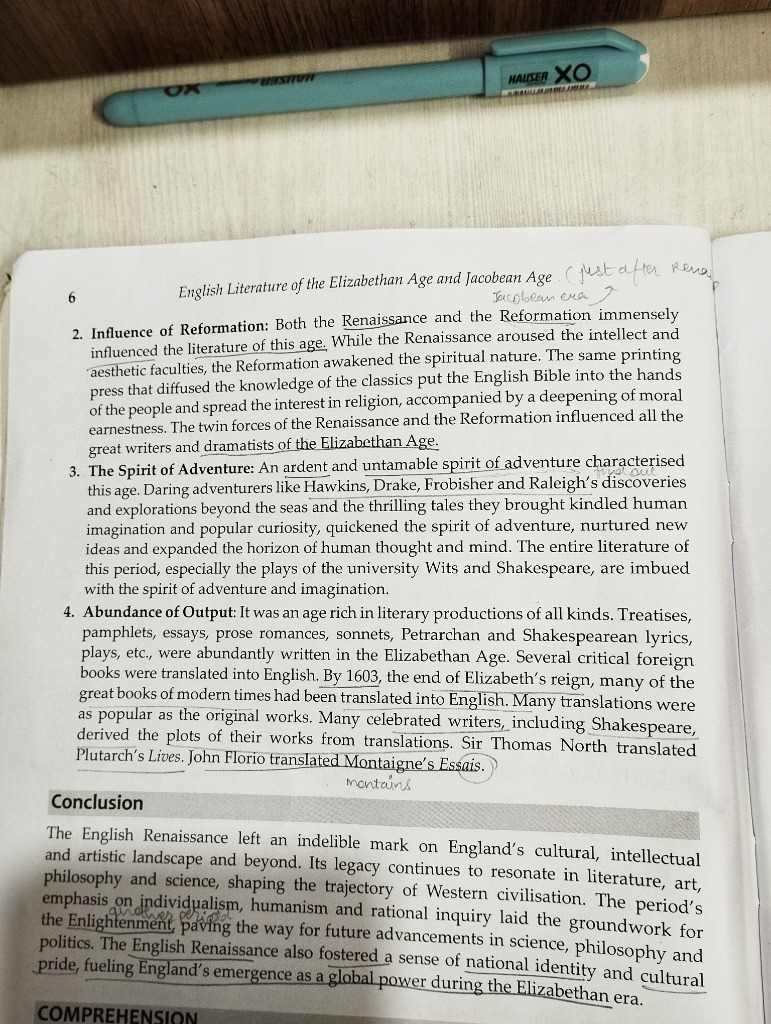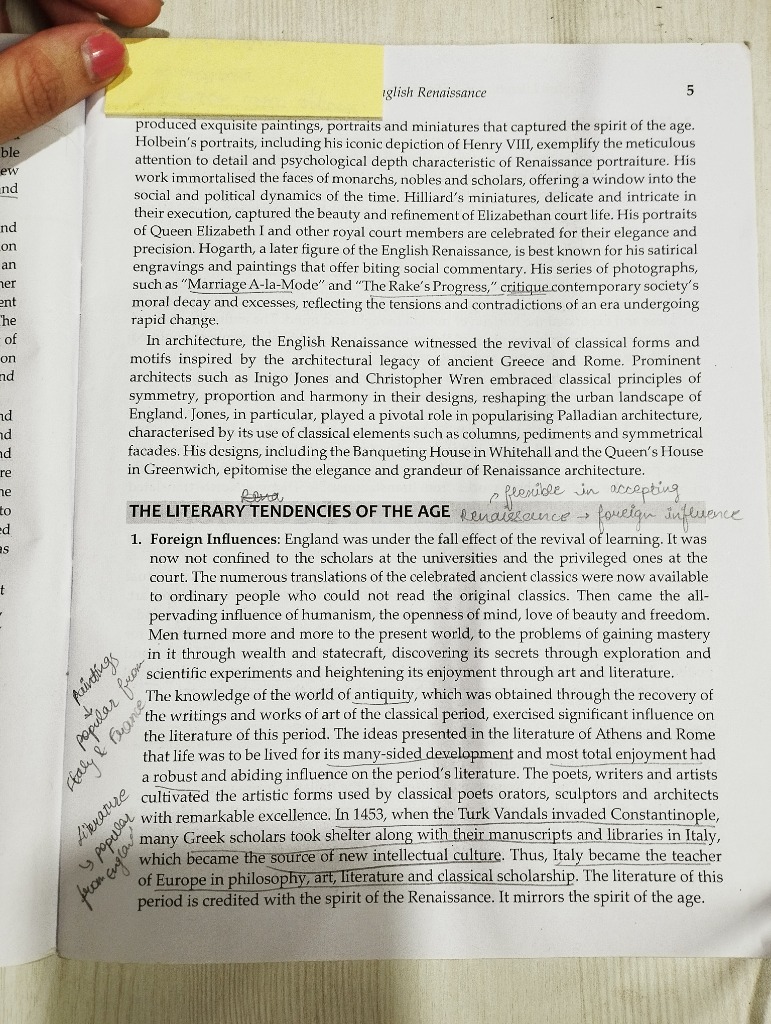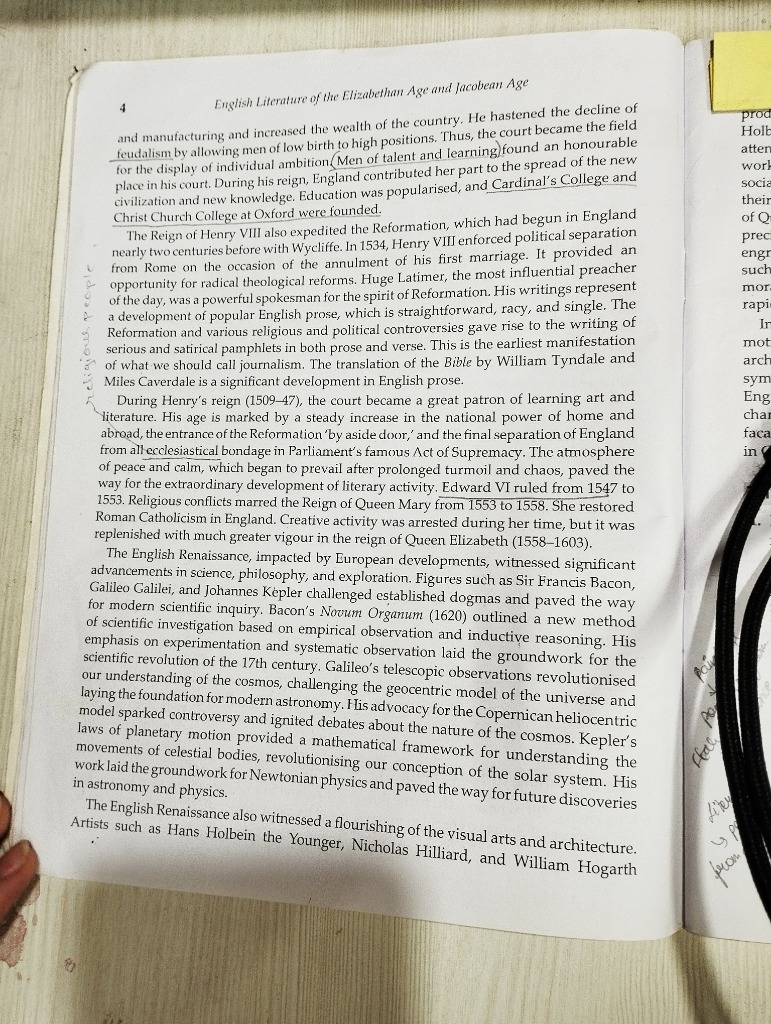Title: Literature and Culture in the Elizabethan & Jacobean Ages
English Literature of the Elizabethan Age and Jacobean Age

2. Influence of Reformation
- Overview: The Reformation significantly influenced the literature of the Elizabethan age by awakening spiritual awareness and moral earnestness.
- Thoughts: This period's literature often reflected a struggle between old beliefs and new spiritual insights, affecting not only religious thought but also artistic expression.
- Additional Information: The spread of the English Bible through the printing press played a crucial role in this awakening, allowing more people to engage with spiritual texts directly.
3. The Spirit of Adventure
- Overview: The age was characterized by an adventurous spirit marked by explorations and discoveries by figures like Hawkins, Drake, and Frobisher.
- Thoughts: This adventurous mindset fueled not just exploration but also literary themes. Authors began to draw inspiration from the excitement and dangers of the unknown.
- Additional Information: The literature of this time often included tales of heroism and exploration, representing the broader human curiosity and desire for discovery.
4. Abundance of Output
- Overview: The Elizabethan Age saw a high volume of literary works produced, including treatises, sonnets, and plays, with many foreign works being translated into English.
- Thoughts: The influx of translated works enriched the English literary landscape, introducing new styles and ideas that shaped the formation of English literature.
- Additional Information: By 1603, many great foreign classics had been translated, influencing notable writers like Shakespeare, who often adapted stories from these translated works. Writers like Sir Thomas North and John Florio played crucial roles in these translations.
Conclusion
- Overview: The English Renaissance significantly impacted England’s cultural and intellectual landscape, leaving a lasting legacy in literature, philosophy, and science.
- Thoughts: This period laid the groundwork for future advancements and shaped national identity, emphasizing the importance of individualism and inquiry.
- Additional Information: The Renaissance not only fostered artistic and scientific progress but also nurtured a sense of national identity, critical in developing England's role in the world during the Elizabethan era.
Extended readings:
Notes on the English Renaissance

Foreign Influences
-
Revival of Learning: England's intellectual revival was a reaction to the fall of classical learning, emphasizing the rediscovery of ancient texts.
- Thoughts: This highlights the importance of classicism in shaping Renaissance thought. The resurgence of interest in classical literature and philosophy facilitated a broader intellectual movement.
-
Translations of Ancient Texts: Availability of translations allowed wider audiences to engage with classical ideas, previously reserved for scholars.
- Additional Info: This democratization of knowledge played a crucial role in fostering a more educated society, paving the way for advancements in science, art, and philosophy.
-
Humanism: The period saw a significant shift towards humanism, emphasizing individual potential and achievements.
- Ideas: Humanism encouraged people to explore their own human experiences, leading to significant innovations in literature and arts that focused on the human condition.
-
Influence of Classical Works: The writings and art from the classical period significantly influenced English literature and arts during the Renaissance.
- Example: Poets and artists drew inspiration from classical forms, enabling a unique blending of styles that characterized this era.
-
Impact of Greek Scholars: Following the fall of Constantinople in 1453, Greek scholars sought refuge in Italy, bringing manuscripts that enriched European intellectual life.
- Thoughts: This migration not only preserved important texts but also infused European culture with Greek philosophical ideas, further enriching the Renaissance movement.
-
Italy as a Cultural Hub: The influx of Greek scholars transformed Italy into the center of Renaissance thought, influencing other regions, including England.
- Insight: Italy's role as a cultural beacon underscores the interconnectedness of European intellectual developments during the Renaissance.
Summary
The English Renaissance was profoundly shaped by the revival of classical learning, translations of ancient texts, and the influx of ideas through migration. Humanism emerged as a central theme, influencing literature, art, and philosophy across Europe.
Extended readings:
English Literature of the Elizabethan Age and Jacobean Age

Key Points and Thoughts
-
Decline of Feudalism
The transition from feudalism allowed for greater social mobility, enabling individuals of talent and learning to rise to positions of influence. This shift was significant for the cultural and intellectual flowering of the period. -
The Reformation
Initiated by Henry VIII, the Reformation had profound implications for English society, including the establishment of the Church of England. It laid the groundwork for a more critical examination of traditional beliefs and governance. -
Influential Figures
- Hugh Latimer: A key proponent of Reformation ideas; his sermons reflected the emerging spirit of inquiry and reform.
- William Tyndale: Noted for translating the Bible into English, which helped disseminate religious texts to a wider audience, challenging the Catholic Church's monopoly on scriptural interpretation.
-
Henry VIII’s Reign (1509-1547)
Very impactful for the arts, learning, and literature. The atmosphere during this period was characterized by turbulent political changes, which influenced literary development. -
The English Renaissance
Marked by significant advancements in various fields such as science, philosophy, and exploration. The influence of the European Renaissance was crucial in shaping the intellectual landscape of England. -
Scientific Advancements
- Sir Francis Bacon: His work emphasized empirical research and experimentation, reshaping how knowledge was verified and constructed.
- Galileo and Johannes Kepler: Their contributions challenged existing scientific paradigms and led to a major shift in understanding the universe, paving the way for modern astronomy.
-
Visual Arts and Architecture Flourishing
The period saw a significant growth in artistic expression, with prominent artists such as Hans Holbein the Younger, Nicholas Hilliard, and William Hogarth marking the era with their innovative works.
Summary of Contributions
The text indicates that the Elizabethan and Jacobean ages were crucial in developing English literature and arts, shaped by significant changes in political, religious, and scientific realms, ultimately fostering a dynamic cultural landscape.
Extended readings: